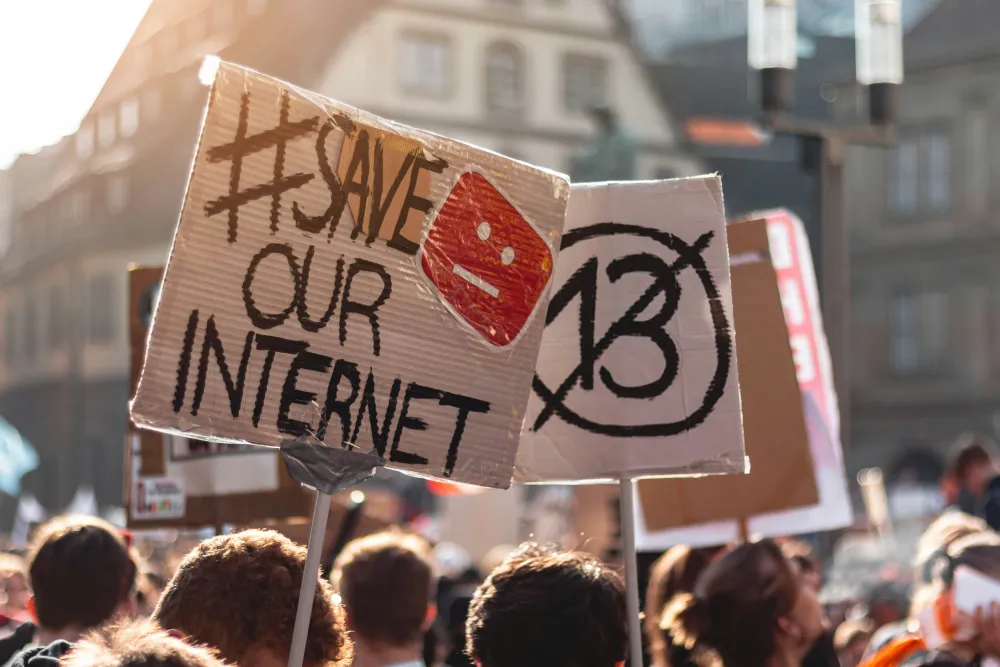
A crowd holds protest signs advocating to "Save Our Internet" and opposing article 13, amidst a sunlit urban setting.
The Economics of Internet Shutdowns: The Global Cost of Digital Censorship
Photo by Christian Wiediger on Unsplash
The consequences of cutting off or restricting internet access by governments goes beyond free speech—it also cause great harm to the economy. We recorded 21 instances of this around the world in the first half of 2024, with India seeing the bulk of these restrictions.
Oftentimes, internet shutdowns in the past have been linked to certain events, like protests, elections, or periods of political instability.
The bigger issue is that when the digital censorship happens, it doesn’t just put a stop to chit-chatting or casual networking on social media—it cuts people off from essential services such as businesses, schools, and even hospitals.
Nine countries imposed restrictions in the first half of 2024 alone, and the economic damage was severe.
Let’s analyze it further.
What Is An Internet Shutdown?
An internet shutdown occurs when a government intentionally disrupts its citizens’ access to the internet or to specific internet services.
Sometimes that means capping internet speeds. At other times, the blackout is total. Either way, it’s an intentional obstruction of how information flows – both in and out.
In some cases, governments will use security concerns to justify their actions. But the data says otherwise and suggests a pattern: most shutdowns take place at politically significant periods, like during elections, political turmoil, or public protests—when people need access the most.
The Heavy Price Tag of Going Offline
An analysis in 2024 said that a 24-hour national internet outage in the U.S. would cause a loss of approximately $11 billion and cost the UK £3 billion.
This illustrates just how much U.S. economy depends on continuously reliable internet, and those numbers will continue to increase.
But how, exactly, do widespread internet outages affect economies? There are many ways:
· Businesses hemorrhage money: Online payments fail, delivery cannot be booked, e-commerce grinds to a halt.
· Startups suffer: Reliable internet is a must for budding businesses, especially for tech-based companies (and there are many).
· Healthcare is disrupted: You can’t access digital health records or remote consultations.
· Education takes a hit: When online coursework and study materials are blocked, students in remote locations are some of the most affected – as are teachers and educators.
· Investor confidence falls: No one wants to invest in (or be associated) with a country that shuts off the internet during periods of unrest.
In short, every time a government decides to flip the switch, whenever a government decides to turn off the switch, it’s not just suppressing criticism, it’s also setting fire to billions of dollars of economic value.
A Snapshot of 2024: Who Shut Down the Internet?
Credit: Surfshark – 21 internet restrictions recorded in the first half of 2024
Important Lessons Learned in Early 2024
· India experienced seven internet outages, largely due to protests. India And having witnessed as many as 123 restrictions since 2015, India is first on this list.
· Pakistan experienced five shutdowns during a contentious election season that was marred by allegations of vote rigging.
· Senegal suffered two shutdowns after its national elections were postponed.
· Comoros, El Salvador and Kenya all restricted internet access for the first time since tracking began in 2015.
Generally, Asia had the most shutdowns at 14, with 6 in Africa and 1 in North America. These shutdowns were predominantly due to political reasons which include elections and protests.
Why Governments Engage In It – And Why It Backfires
Governments order internet shutdowns to restore a sense of order during volatile times and slow the spread of information and rallying, but this tactic generally backfires and make things worse.
Limiting communications makes it more difficult for people to verify information or to organize peaceful protests. Worse, it gives people the impression that democratic elections are rigged or suspect, making the anxiety and paranoia a lot worse.
What Can People Do About It?
Options are limited for those subjected to digital restrictions, though some do use virtual private networks, or VPNs.
Thanks to these services, the open internet can be reached, regional limitations can be bypassed, and identity can be shielded during times of censorship and uncertainty.
One such example is available on Surfshark's official website, where you can also find resources to understand where and how internet shutdowns are implemented worldwide.
However, not every country permits VPNs, and it can be risky to use one when the government is trying to shut it down. Before using such tools, it is important for users to know their local law.
Looking Forward: Can We End Shutdowns?
There’s growing pressure around the world to end internet censorship. Human rights advocacy groups are pushing for free access to the internet. But, except these shutdowns somehow hurt the pockets and finances of governments, things might not change.
Here are a few ways we can reduce digital censorship:
· Censorship can carry trade penalties for countries
· Passing laws that require governments to explain why they shut down the internet
· Providing support for decentralized internet tech
Conclusion
While internet shutdowns are clearly political tools, they’re also economic wrecking balls, as we have seen time and time again. When you take away free access to the internet, you find yourself dealing with misinformation, democracy fails, and may end up losing billions of dollars.
Without more transparency, the world’s poorest students, small business owners, and average citizens will continue to pay a heavy price for censorship
Though governments may try to spin a narrative, the data doesn’t lie—and it is not a pleasant one.


